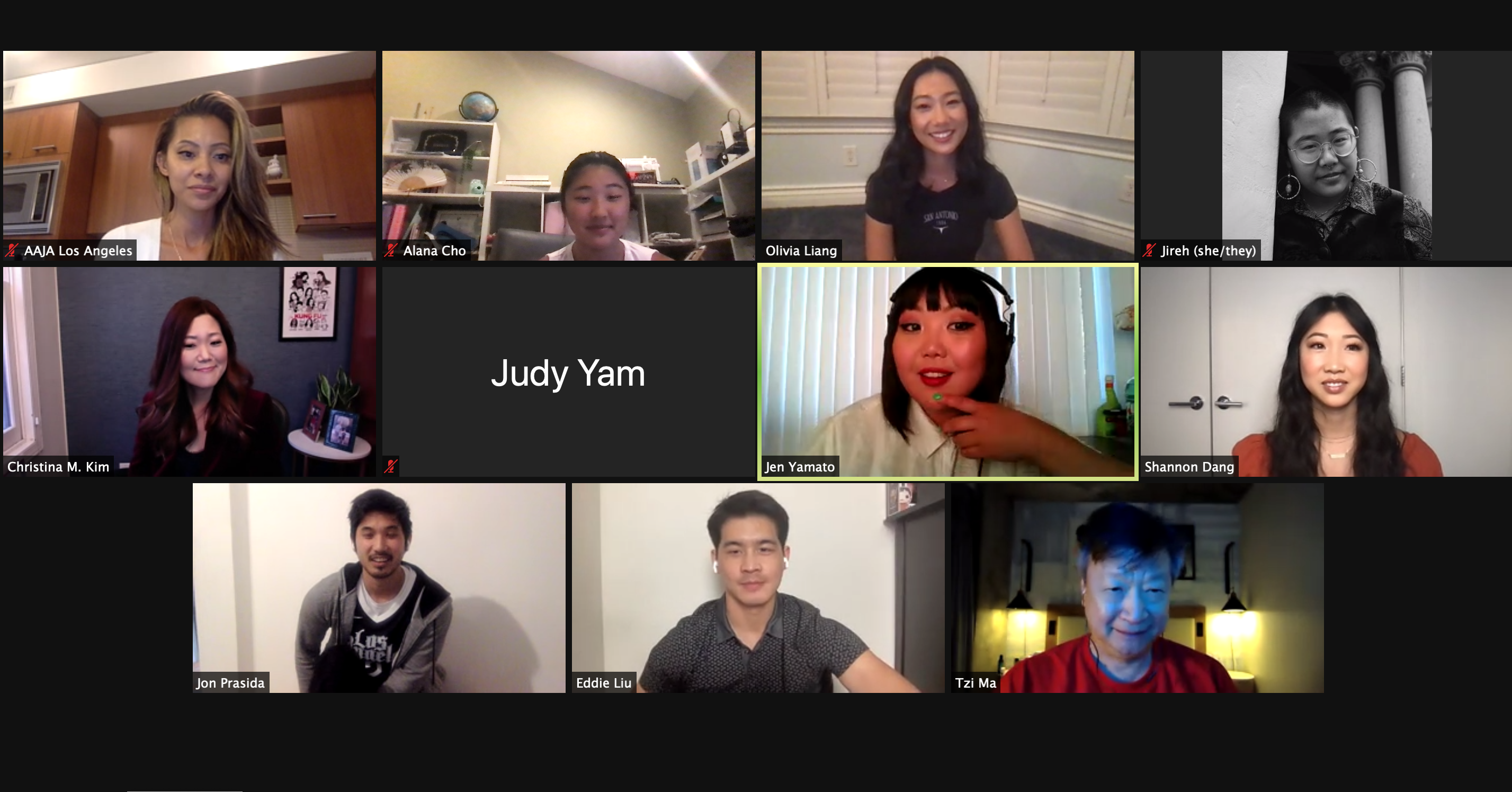Producing TV show Kung Fu for a New Generation
AAJA-LA’s Virtual Panel Moderated by LA Times’ Jen Yamato
Alana Cho

“Fu Manchu, your time is over!” Tzi Ma resolutely exclaimed to an excited audience over zoom about how the tide is turning for Asian American representation in the media. Ma stars in the latest iteration of the 1970s TV show Kung Fu.
Ma, along with his fresh-faced castmates consisting of Olivia Liang (Nicky Shen), Shannon Dang (Althea Shen), Jon Prasida (Ryan Shen), and Eddie Liu (Henry Yan), gathered for an exclusive panel moderated by The LA Times’ entertainment reporter Jen Yamato organized by AAJA-LA (Asian American Journalists Association – LA chapter).
Also on the panel was showrunner Christina Kim who spoke about making it her mission to create a show that corrected the wrongs of its problematic predecessor. Kim says, “Selfishly, I wanted to write a really strong female Asian character and someone that, when I was growing up I never saw on tv and I want for my children to see someone like Olivia and just be inspired by her.”
It was a night filled with thought-provoking discussion and frank conversations that included the cast’s projections on where their characters will end up next season, the different hashtags and ship names, and how they incorporate important current messages such as AAPI hate crimes and the Black Lives Matter Movement into the show.
Kung Fu starts as Nicky Shen, a Harvard student goes on a cultural trip to China to connect with her roots and, as her mother hopes, find the ideal Chinese husband. Unexpectedly, she ends up at a monastery seeking refuge from the matchmaker that her mother commissioned.
Executive producer Christina Kim explained, “the real story starts when she comes home after her three years at the monastery. She returns to her family and realizes that a lot has changed within her family in the city of San Francisco and she herself has changed.” Olivia Liang who portrays Nicky Shen described Nicky’s journey, “we see her realize her destiny and what she was meant to do this whole time.”
A highlight of the evening was an animated discussion about Tzi Ma’s character Jin Shen. His unique humanistic perspective, parenting style, and unconditional love towards his children is an outlier to the common stereotype of the Asian father, which has often been portrayed on screen as stoic and cold. Ma describes that a core value that Jin believes in is that, “success is something that if it was just for the sake of succeeding, it’s quite shallow. There is no meat to it. If you have not failed, you don’t know the taste of failure, I’m not sure how well you’re going to know your successes.” Jin’s novel parenting style is new to many children of Asian parents and may influence the way future and current parents teach their children.
One topic discussed that resonated with not only the cast but also with the national and international audience tuning in to the panel was the lack of Asian representation on television. As an Asian American actress, Dang added, “We didn’t have very many people to look up to when we were going out and auditioning and wanting to aspire to be actors. So, the fact that we can do this for others, I think it’s really special.”
When the actors all came together for the audition of the Kung Fu roles, they recalled that, unlike every other audition, they all supported each other and were happy that any of them would get the part. Prasida even remembered that “in the audition room, we were so excited for each other. We even went out to lunch afterward, all of the potential Nickys, Altheas, and Ryans, and Henrys.” The comradery amongst all the Asian American actors and actresses stems from the yearning to make any improvement in representation in the industry.
One topic that has not only become more prevalent in today’s society but also in Kung Fu’s plot is its treatment of racism. When discussing the incorporation of AAPI hate crimes and the Black Lives Matter movement into the show, Kim explained, “We really wanted the storyline to be woven into each character and to give each character the chance to talk about race and racism and their experience with it. And, the differences between the older generation and the younger generation”. She and co-showrunner Bob Barron wanted to have the BLM movement shown through the eyes of the Shen family, a perspective unique to Kung Fu, and show the different ways BLM affects other minority groups.
Many older Asian American immigrants do not talk about the racism they faced when they first arrived in America. However, in Kung Fu, the mother of the Shen family Mei-Li played by Tan Kheng Hua, opens up about her history with racism. This is a concept often foreign to children of immigrants because it is not a conversation that is comfortable to have. Kung Fu’s courageous and honest approach to this situation with its characters will hopefully inspire other minorities to have this conversation with their own families.
The cast and production of Kung Fu are working hard to inspire more AAPI actors so that in the future, the playing field is level and the idea of AAPI lead actors is not so foreign in our society. Kung Fu tackles many serious concepts and shines a bright light on Asian American culture. It is changing how people perceive Asians by fluently tackling many societal issues and bringing life to the Shen family.

